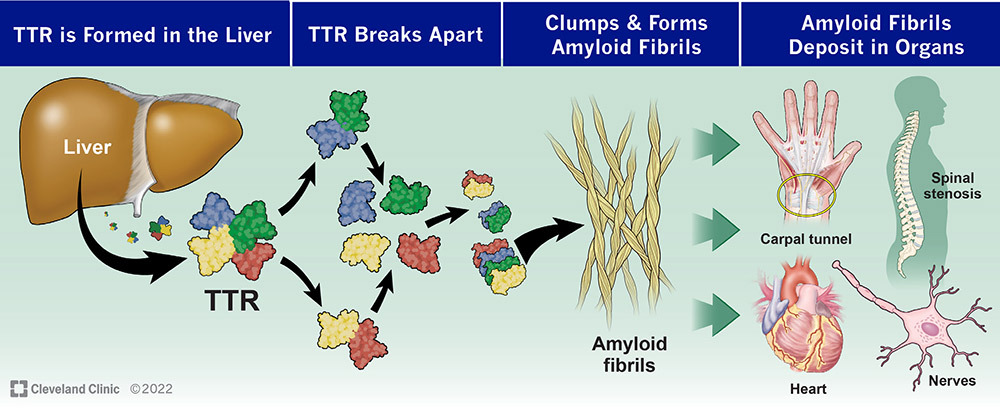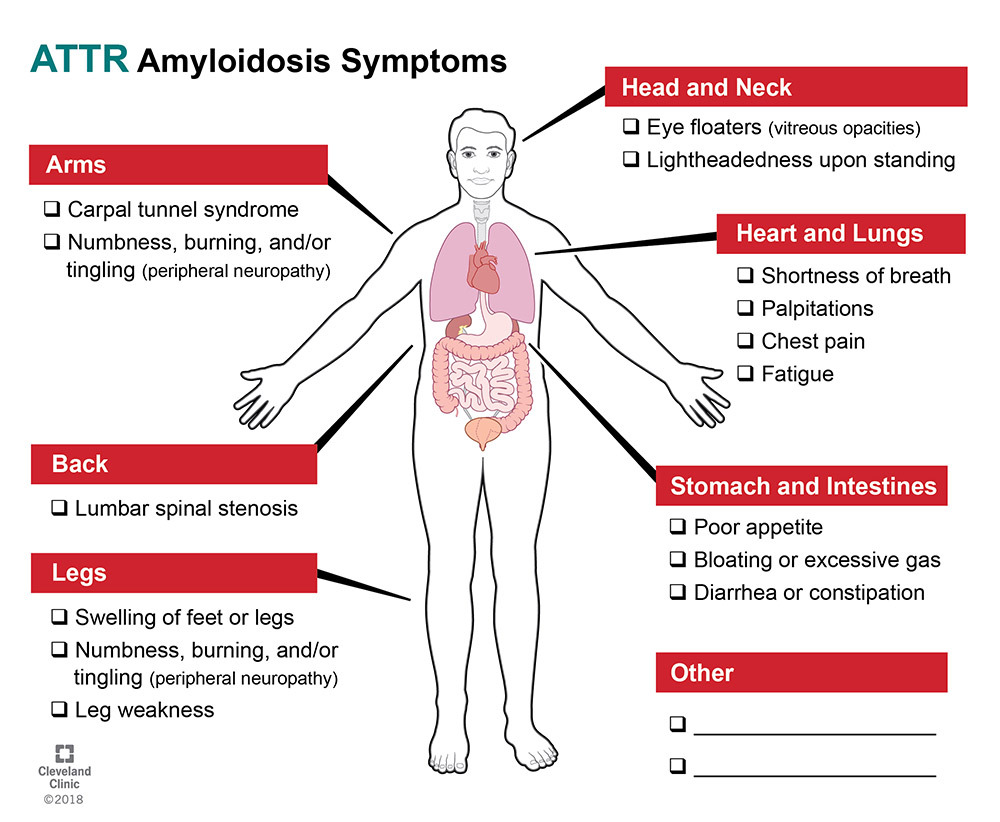What is amyloidosis?
Amyloidosis (am-uh-loy-doh-sis) is a protein disorder. In this disease, proteins change shape (misfold), then stick together and form amyloid fibrils that deposit in your organs. As the fibrils build up, your tissues and organs may not work as well as they should.
Our bodies make several proteins that can cause amyloidosis. The two most common types are light chain (AL) and transthyretin (ATTR) amyloidosis. It is very important to know the exact protein that is causing the disease so you can get the right treatment.
What is ATTR amyloidosis?
Transthyretin (trans-thy-re-tin), also called TTR, is a protein made by the liver. It helps carry thyroid hormone and vitamin A in your blood. Normally, TTR is made up of four identical parts. But, in ATTR amyloidosis, the protein becomes unstable, breaks apart, and deposits in your heart, nerves and/or ligaments.

Types of ATTR amyloidosis
There are two types of ATTR amyloidosis:
- Hereditary (familial).
- Wild-type.
Hereditary (familial) ATTR amyloidosis. This type of amyloidosis is inherited and can be passed from one generation to the next. It involves a change (mutation) in the DNA that makes the TTR protein less stable and more likely to form amyloid fibrils. Depending on the mutation, you may have symptoms that affect your nerves and/or heart.
Wild-type ATTR amyloidosis. Unlike hereditary ATTR amyloidosis, wild-type does not involve abnormal DNA and is not passed on to family members. Instead, as you get older, the normal TTR protein becomes unstable, misfolds and forms amyloid fibrils.
The fibrils usually deposit in your:
- Wrist, in a narrow pathway called the carpal tunnel. This can lead to carpal tunnel syndrome, which causes your hand and arm to become numb and tingle.
- Spinal canal, which can cause your spinal column to become narrow (spinal stenosis).
- Heart, which can cause heart failure and/or an abnormal heart rhythm called atrial fibrillation.
- Ligaments in your arms, which can cause problems with your biceps and shoulders.
Carpal tunnel syndrome and spinal stenosis can develop several years before heart failure.
Glossary of terms
- Amyloid fibril: A rigid stack of amyloid proteins that builds up in the organs.
- Amyloidosis: A disease caused by a buildup of abnormally shaped proteins (amyloid proteins) in organs.
- Atrial fibrillation: An irregular heart rhythm.
- Biopsy: A small piece of tissue that is removed and examined under a microscope.
- Cardiac magnetic resonance imaging (MRI): A scan that creates detailed pictures of the heart and shows how well it is working.
- Echocardiogram: An ultrasound of the heart to show how well it is working.
- Electrocardiography (EKG): A recording of the heart’s electrical activity.
- Proteins: Large molecules that control the structure and function of the body’s tissues and organs.
- Technetium-pyrophosphate scan (TcPYP): A bone scan that can tell if there is ATTR in the heart.
- Transtheyretin: A protein produced by the liver.
What are the signs and symptoms of ATTR amyloidosis?
Amyloid transthyretin amyloidosis can affect many organs. Symptoms depend on the organs that are involved.

How is ATTR amyloidosis diagnosed?
Many tests can help diagnose amyloidosis. A biopsy (the removal of a small piece of tissue) of the affected organ is the most useful test. To take a biopsy from the heart, a small, thin, hollow tube (catheter) is placed into a vein in your neck and guided into the right side of your heart. A few small pieces of heart muscle are removed. A pathologist will examine the tissue with a microscope and perform special tests to identify the exact protein causing the amyloidosis.
A bone scan called a technetium pyrophosphate (TcPYP) scan can detect ATTR in your heart. If you have a positive TcPYP scan, along with blood and urine tests to rule out other forms of amyloidosis, you will not need a heart biopsy to confirm the diagnosis. Once it is confirmed that you have ATTR amyloidosis, you will have a blood test to find out if you have the hereditary or wild-type.
You may have other tests such as:
- Blood tests to check your kidneys, heart and liver.
- An electrocardiogram (EKG), echocardiogram (ultrasound of the heart) and MRI to check your heart.
Genetic Counseling/Testing
If you have ATTR amyloidosis, talk to a genetic counselor. Close family members, such as parents, siblings and children have a 50% chance of having the condition. A genetic counselor can help you learn more about risks and genetic testing.
Your treatment team will likely include:
- Cardiologist: A doctor that specializes in the heart.
- Gastroenterologist: A doctor who specializes in the gastrointestinal tract.
- Genetic Counselor: A healthcare worker who helps patients and family members understand the risk of inheriting certain medical conditions.
- Hematologist: A doctor that specializes in blood problems.
- Nephrologist: A doctor that specializes in the kidneys.
- Neurologist: A doctor that specializes in the nerves.
What treatments are available?
Approved medications
ATTR silencers help your liver produce less TTR.
- Patisiran (Onpattro) and inotersen (Tegsedi) are medications for patients with the hereditary type of ATTR and neuropathy. Patisiran is an IV drug given every 3 weeks. Inotersen requires a weekly shot under your skin.
ATTR stabilizers prevent the ATTR protein from breaking apart and forming amyloid fibrils.
- Tafamidis (Vyndamax, Vyndaqel) is a medication in pill form for patients with hereditary or wild-type ATTR and heart problems. It is not approved for patients with ATTR amyloidosis and neuropathy without heart problems.
Fibril disruptors are designed to help break up and clear ATTR amyloid fibrils. This type of medication is not yet available.
Medications being studied in clinical trials
- Vutrisiran and Eplontersen are ATTR silencers given by injection under the skin. They are being studied in two trials that include patients with hereditary ATTR amyloidosis and patients with wild-type ATTR amyloidosis who have either neuropathy (Trial #1) or heart problems (Trial #2).
- Acoramidis is an ATTR stabilizer in pill form being studied in patients with hereditary or wild type ATTR amyloidosis and heart problems.
- NNC-6019-0001 (formerly PRX004) is an antibody that is a fibril disruptor that may help remove amyloid fibrils. It is an IV drug given once a month. A Phase I study showed it to be safe for patients with hereditary ATTR amyloidosis who have neuropathy. A Phase II trial is planned for late 2022 to study the drug in patients with hereditary or wild-type ATTR amyloidosis and heart problems.
- NI-006 is an antibody that is a fibril disruptor that may help remove amyloid fibrils. Early- stage Phase I trials are being planned to study this medication.
- NTLA-2001 is a drug designed to remove the DNA code that produces TTR by using technology called CRISPR CAS9. It is given one time through an IV. The medication was involved in early trials that showed proof of the concept, but there is no long-term follow-up information available. More trials are being planned.
If you are interested in being part of a clinical trial, please ask your doctor for more information.
Supplements
- Some supplements, such as green tea extract and turmeric, have been used in patients with ATTR amyloidosis. There is not enough evidence-based research to support using them as treatment options.
Liver transplant
- Because TTR is made in the liver, a liver transplant is a treatment option for patients with some hereditary forms of ATTR amyloidosis.
- A liver transplant is not a treatment option for patients with wild-type ATTR amyloidosis.
How does ATTR amyloidosis affect my life?
Amyloidosis is a long-term (chronic) disease. The impact on your life depends, in part on which organs are affected. Early diagnosis and treatment are the keys to managing the disease before it becomes advanced.
Resources
- Cleveland Clinic Amyloidosis Center, clevelandclinic.org/amyloidosiscenter.
- Cleveland Clinic Center for Personalized Genetic Healthcare, clevelandclinic.org/cpgh, 216.636.1768.
- Amyloid Foundation, amyloidosis.org, 877.269.5643 (1.877.AMYLOID), Email: info@amyloidosis.org.
- Amyloidosis Support Groups, amyloidosissupport.org, 1.866.404.7539, Email: info@amyloidosissupport.org.
- Amyloidosis Research Consortium, arci.org, 617.467.5170, Email: arc@arci.org.